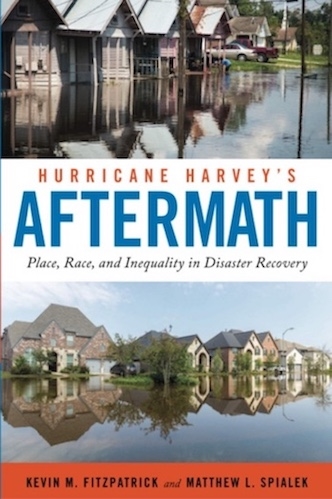Kevin Fitzpatrick and Matthew L. Spialek will discuss findings from their book, Hurricane Harvey's Aftermath, as part of the Pryor Center Presents lecture series hosted by the David and Barbara Pryor Center for Arkansas Oral and Visual History in the Fulbright College of Arts and Sciences.
Fitzpatrick, University Professor, and Bernice Jones, Chair in Community in the Department of Sociology and Criminology, and Spialek, assistant professor in the Department of Communication, will provide insight into how ordinary people experience and persevere through a disaster in an age of environmental vulnerability.
This event will be held via Zoom at 6 tonight, April 1, and registration is required.
Hurricane Harvey was one of the worst American natural disasters in recorded history. It ravaged the Texas Gulf Coast and left thousands of people homeless in its wake. Fitzpatrick and Spialek offer first-hand accounts from survivors, providing a rare, on-the-ground perspective of natural disaster recovery. Drawing on interviews from more than 350 survivors, Fitzpatrick and Spialek trace the experiences of individuals and their communities, both rich and poor, urban and rural, white, Latinx, and Black, and how they navigated the long and difficult road to recovery after Hurricane Harvey. From Corpus Christi to Galveston, they paint a vivid, compelling picture of heartache and destruction, as well as resilience and recovery, as survivors slowly begin rebuilding their lives and their communities.
Join the Pryor Center for this presentation which will highlight some of Fitzpatrick's and Spialek's findings and insights from this year-long effort funded by the National Science Foundation. If you would like to order a copy of their book, Hurricane Harvey's Aftermath, visit New York University Press online and use the discount code HARVEY30-FM to receive 30% off and free domestic shipping.
Fitzpatrick is a community sociologist with 35 years of experience as a researcher, consultant, and advocate. Since 2005, he has devoted the majority of his work-focus on helping communities throughout Arkansas better understand the challenges they face and the types of strategies they might consider adopting to address those challenges. Fitzpatrick has published six books and nearly 100 peer-reviewed articles and book chapters that have continually emphasized the theme that place matters.
Spialek is a disaster communication researcher. His research explores how individuals build relationships with organizations and local media in order to foster the civic vitality, public health and resilience in communities that have experienced or are at risk of experiencing crises and disasters. Spialek has published a number of articles that consistently examine the role of resilience in the natural disaster framework. His most recent works examine the importance of communication systems in helping citizens prepare for, respond to and recover from natural disasters.
Pryor Center Presents Lecture Series Calendar
- Apr. 21 - Caree A. Banton - "Elections and Identity Politics: Interrogating Group Belonging in Black and White Republics" - To register
About the David and Barbara Pryor Center for Arkansas Oral and Visual History: The David and Barbara Pryor Center for Arkansas Oral and Visual History is an oral history program with the mission to document the history of Arkansas through the collection of spoken memories and visual records, preserve the collection in perpetuity, and connect Arkansans and the world to the collection through the Internet, TV broadcasts, educational programs, and other means. The Pryor Center records audio and video interviews about Arkansas history and culture, collects other organizations' recordings, organizes these recordings into an archive, and provides public access to the archive, primarily through the website at http://pryorcenter.uark.edu. The Pryor Center is the state's only oral and visual history program with a statewide, seventy-five county mission to collect, preserve, and share audio and moving image recordings of Arkansas history.
About the Fulbright College of Arts and Sciences: The Fulbright College of Arts and Sciences is the largest and most academically diverse unit on campus with three schools, 16 departments and 43 academic programs and research centers. The college provides the core curriculum for all University of Arkansas students.
About the University of Arkansas: The University of Arkansas provides an internationally competitive education for undergraduate and graduate students in more than 200 academic programs. The university contributes new knowledge, economic development, basic and applied research, and creative activity while also providing service to academic and professional disciplines. The Carnegie Foundation classifies the University of Arkansas among only 2 percent of universities in America that have the highest level of research activity. U.S. News & World Report ranks the University of Arkansas among its top American public research universities. Founded in 1871, the University of Arkansas comprises 10 colleges and schools and maintains a low student-to-faculty ratio that promotes personal attention and close mentoring.
Topics
Contacts
William A. Schwab, executive director
Pryor Center
479-575-6829, bschwab@uark.edu
